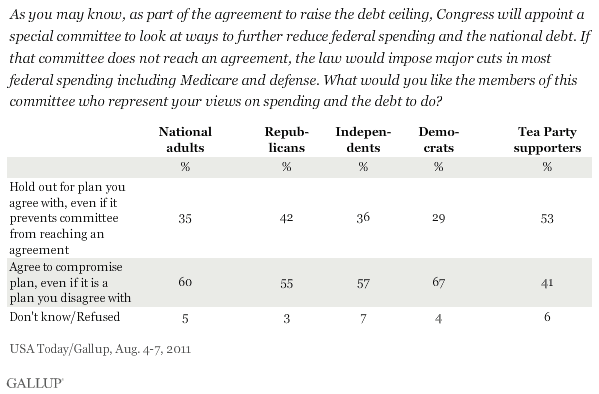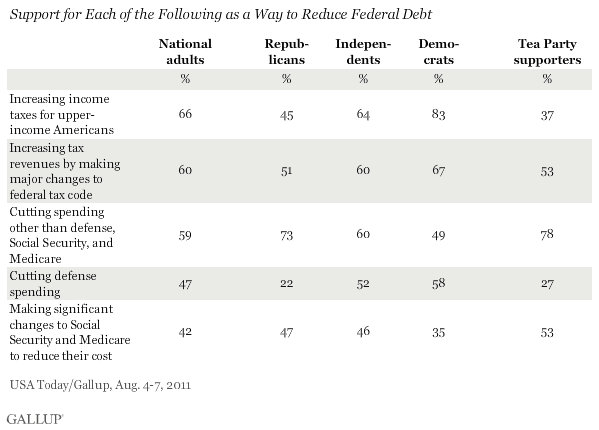PRINCETON, NJ -- Six in 10 Americans say members of the new bipartisan "supercommittee" mandated to find new ways of reducing the federal budget deficit should compromise, even if the agreement reached is one they personally disagree with. This includes a majority of Republicans, independents, and Democrats. A majority of Tea Party supporters, however, say the committee should hold out for a plan they agree with, even if no agreement is reached.

The debt ceiling legislation passed last week mandates Congress to appoint 12 members of the new bipartisan Joint Select Committee on Deficit Reduction by Aug. 16. The committee has until Nov. 23 to develop its proposals for reducing the deficit.
Standard and Poor's downgrading of the U.S. credit rating on Friday, along with the generally downward movement of the stock market in recent weeks, may have reinforced Americans' pre-existing preference for political compromise. Democrats (67%) are the most inclined to say the committee should seek compromise, but a majority of Republicans (55%) and independents (57%) agree.
Among the one in four Americans who identify themselves as "supporters of the Tea Party movement," 53% would rather have lawmakers hold out for a plan they agree with, while 41% advocate compromise. Fourteen percent of Americans view themselves as strong Tea Party supporters, and 58% of this group (about 31% of all Republicans) takes the hard-line stance.
Increasing Taxes Leads Among Five Potential Approaches to Reduce Federal Debt
Asked about potential approaches the subcommittee may consider to reduce federal debt, a majority of Americans support increasing taxes on higher-income Americans, increasing tax revenues by making major changes to the current federal tax code, and cutting federal programs other than Medicare, Social Security, and defense. Less than half support the idea of cutting either defense spending or Medicare and Social Security costs as a way to reduce the deficit.

There is little consensus across political lines on any of these five approaches, underscoring the difficulties ahead for the bipartisan supercommittee. A majority of Republicans favor two of the approaches -- cutting spending other than defense, Social Security, or Medicare, and changing the tax code to increase revenues. A majority of Democrats agree on the idea of reforming the tax code, but also favor increasing income taxes on upper-income Americans and cutting defense spending.
Implications
Taken as a whole, Americans clearly want their elected representatives in Washington to reach a compromise on the next step in the efforts to reduce the federal deficit. While the relatively small segment of the population that supports the Tea Party favors holding out for a plan they agree with, a majority of Republicans, independents, and Democrats mandate compromise.
There are, however, strongly divergent opinions across political lines on the issue of exactly how to reduce the deficit. Republicans and Democrats agree on the idea of reforming the tax code to bring in more revenues, but disagree on other proposals.
The federal budget legislation passed last week mandated that defense and Medicare would be cut back if the new supercommittee is not able to reach an agreement on a different plan, and if a balanced budget amendment is not passed. A majority of independents and Democrats would accept cutting defense spending, but Republicans would not. On the other hand, less than half of any political group other than the Tea Party favors cutting back on Medicare and Social Security.
Survey Methods
Results for this USA Today/Gallup poll are based on telephone interviews conducted Aug. 4-7, 2011, with a random sample of 1,319 adults, aged 18 and older, living in all 50 U.S. states and the District of Columbia.
For results based on the total sample of national adults, one can say with 95% confidence that the maximum margin of sampling error is ±4 percentage points.
Interviews are conducted with respondents on landline telephones and cellular phones, with interviews conducted in Spanish for respondents who are primarily Spanish-speaking. Each sample includes a minimum quota of 400 cell phone respondents and 600 landline respondents per 1,000 national adults, with additional minimum quotas among landline respondents by region. Landline telephone numbers are chosen at random among listed telephone numbers. Cell phone numbers are selected using random-digit-dial methods. Landline respondents are chosen at random within each household on the basis of which member had the most recent birthday.
Samples are weighted by gender, age, race, Hispanic ethnicity, education, region, adults in the household, and phone status (cell phone only/landline only/both, cell phone mostly, and having an unlisted landline number). Demographic weighting targets are based on the March 2010 Current Population Survey figures for the aged 18 and older non-institutionalized population living in U.S. telephone households. All reported margins of sampling error include the computed design effects for weighting and sample design.
In addition to sampling error, question wording and practical difficulties in conducting surveys can introduce error or bias into the findings of public opinion polls.
View methodology, full question results, and trend data.
For more details on Gallup's polling methodology, visit www.gallup.com.
